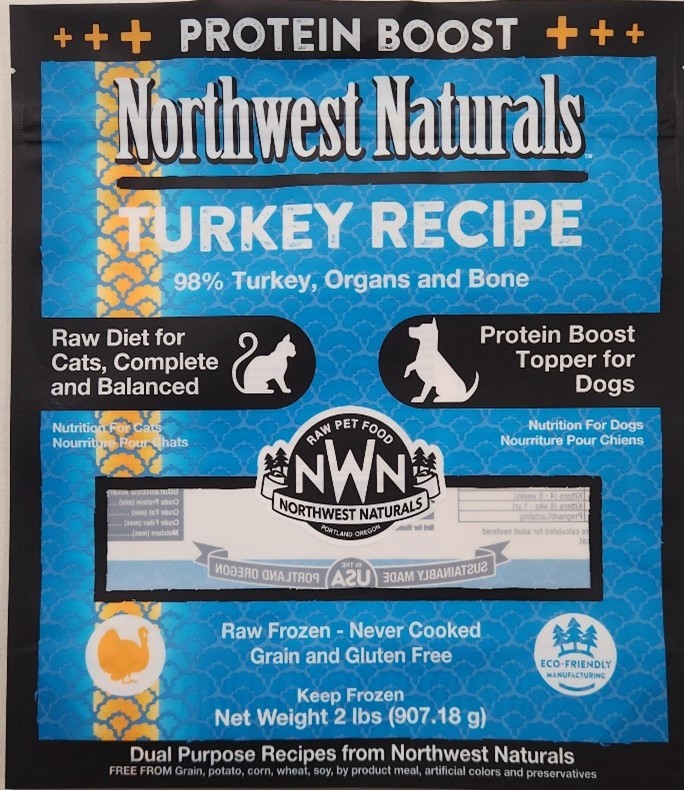Cat Food Sold Nationwide Recalled After Testing Positive for Bird Flu

Scientists are still trying to determine if bird flu could become a widespread concern for humans. But the threat to cats has been well-established, as the animals are often found on farms with dairy cattle, The New York Times recently explained. And now, the concern for domestic animals has increased, as cat food sold nationwide has been recalled after testing positive for bird flu.
RELATED: 9,600 Pounds of Dog Food Recalled Over Serious Health Risks.
Northwest Naturals voluntarily recalled some of its raw cat food after it tested positive for bird flu.

Portland, Oregon-based pet food brand Northwest Naturals voluntarily recalled one batch of its two-pound Feline Turkey Recipe raw frozen cat food “after it was tested positive for highly pathogenic avian influenza (HPAI) virus,” the company said in its Dec. 24 notice.
The affected two-pound plastic bags have “best if used by” dates of 05/21/26 B10 and 06/23/2026 B1. It was sold through distributors in the following states (as well as British Columbia, Canada):
- Arizona
- California
- Colorado
- Florida
- Georgia
- Illinois
- Maryland
- Michigan
- Minnesota
- Pennsylvania
- Rhode Island
- Washington
“Consumers who have purchased the recalled product should immediately discard the product and contact the place of purchase for a full refund,” the notice states.
One house cat died from eating the affected food.
At the time of writing, one Oregon house cat died from consuming the affected pet food. The Oregon Department of Agriculture (ODA) conducted the laboratory testing on the cat food.
“We are confident that this cat contracted H5N1 by eating the Northwest Naturals raw and frozen pet food,” said ODA State Veterinarian Ryan Scholz, DVM. “This cat was strictly an indoor cat; it was not exposed to the virus in its environment, and results from the genome sequencing confirmed that the virus recovered from the raw pet food and infected cat were exact matches to each other.”
The ODA says it is monitoring the household members for flu-like symptoms who had contact with the cat.
“To date, no human cases of HPAI have been linked to this incident, and the risk of HPAI transmission to humans remains low in Oregon,” they state.
Should you worry about your cat or dog?
According to the American Veterinary Medical Association (AVMA), “The viruses that cause avian influenza (or “bird flu”) mainly infect and spread among wild aquatic birds, such as wild ducks, geese, and storks, and domestic poultry, such as chickens and turkeys. Backyard flocks (poultry or non-poultry) are also at risk, as are captive or pet birds with access to the outdoors, where they could be exposed to infected wild birds or virus-contaminated surfaces or materials.”
However, the Centers for Disease Control and Prevention notes that this year, bird flu spread among dairy cattle for the first time in the U.S. As of Dec. 23, 2024, 876 dairy herds in 16 states have been affected.
As for how cats and dogs can catch the virus, the AVMA says they “may become infected if they eat sick or dead infected birds, drink unpasteurized milk or cream from infected cows, or eat undercooked or raw meat.”
“Although the likelihood of dogs catching avian influenza continues to be very low, several barn/feral cats have become severely ill from H5N1 infection since the outbreak in cattle began,” the AVMA adds.
To keep your pet safe, keep them indoors and away from wild birds and their droppings, keep their food and water bowls indoors, and avoid feeding them raw meat or poultry and unpasteurized milk.
The AVMA says the following are common symptoms of HPAI infection in dogs and cats:
- Fever
- Lethargy
- Lack of appetite
- Red or inflamed eyes
- Discharge from the eyes or nose
- Difficulty breathing
- Neurologic signs, like tremors, seizures, incoordination, or blindness
How to keep yourself safe:
The CDC “believes the current risk to the general public from bird flu viruses is low,” save for those who work with dairy cattle.
There have been no reported cases of person-to-person spread, though the CDC reports 65 total human cases of bird flu in the U.S., 36 of which were in California, 11 in Washington, and 10 in Colorado.
Of these cases, 39 were linked to dairy herds and 23 to poultry farms and culling operations.
The CDC recommends avoiding sick or dead wild birds, poultry, or other animals to protect against bird flu. If you must have contact with these animals, wear the appropriate personal protective equipment (PPE). Do not touch surfaces that these animals come in contact with, and if you do, immediately wash your hands thoroughly.
Finally, “Do not touch or consume raw milk or raw milk products, especially from animals with confirmed or suspected avian influenza A virus infection,” the CDC advises.